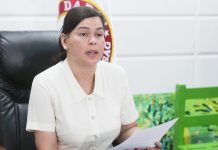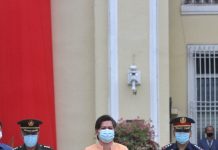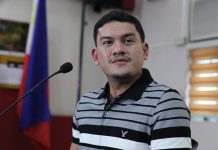THE Department of Social Welfare and Development (DSWD) in the region reported that it has documented this year some 41 cases of trafficking in persons mostly involving adult women who were victims of illegal recruitment.
DSWD technical assistant division chief Raquel Nuñez said that most of the cases were referrals from various government and non-government organizations in Davao Region, and one case from a rescue operation in Davao City.
Nuñez told the media here during Friday’s Kapihan sa PIA that the cases were referred to DSWD for psycho-social interventions and provision of temporary shelters for the victims.
She said that majority of the victims were adult women aged 20-40 years old, and the youngest victim was a 16-year old child.
Nuñez said that the victims were recruited illegally by agencies and private persons for a promised employment outside the region and abroad.
She added that Davao Oriental has the highest cases of human trafficking, followed by Compostela Valley and Davao del Norte.
According to DSWD official, 27 of the victims have returned to their respective families after undergoing psychosocial interventions such as counseling, evaluation, and treatment from DSWD center.
Meanwhile, Davao-based Talikala, Inc. has documented 35 cases of human trafficking for the period of January to November this year.
“The victims were mainly trafficked for sexual trade,” reported Jeanette Ampog, executive director of Talikala a non-government organization catering to prostituted women and children.
She disclosed that 90 percent or 33 of the victims were young girls aging 14-17 years old who were cunningly recruited to become call girls, GROs, entertainers and dancers.
According to Talikala’s documentation, the receiving places of the victims in Mindanao are in Samal Island, Panabo City, Sto. Tomas and Kapalong in Davao del Norte; Maragusan, Diwalwal and Monkayo in Compostela Valley; Tacurong, Sultan Kudarat and in Polomolok, South Cotabato.
Ampog said that some of the young girls were brought by their recruiters from Davao to Cebu, and others from Davao to Palawan.
Out of the 35 cases, Talikala has catered to 21 victims who were provided with psychosocial interventions including counseling, legal advices and provision of livelihood projects for the parents.
However, Ampog lamented that the victims settled on not filing any case to court due to fear.
Since the inception of Republic Act 9208 or the Anti-Trafficking in Persons in 2003, assistant regional prosecutor Barbara Mae Flores of the Department of Justice said that only 33 cases have been file in the courts of Davao Region.
Flores reported that 22 of the cases were filed in Davao City, and the rest were scattered in the other courts of the region.
She disclosed that five cases of human trafficking have already resulted to convictions, while about ten cases are undergoing trials.
The rest of the cases were dismissed due to a reason that the victims were no longer interested to pursue the case, and some were archived because the accused were not arrested, Flores said.
However, she added that the archived cases could still be reviewed to determine if a follow-up could be made with the help of the law enforcers. [PIA-11/CARINA L. CAYON]






